2010年中考英语反意疑问句专项指导练习整理12
中考英语反意疑问句特级综合练习题30题
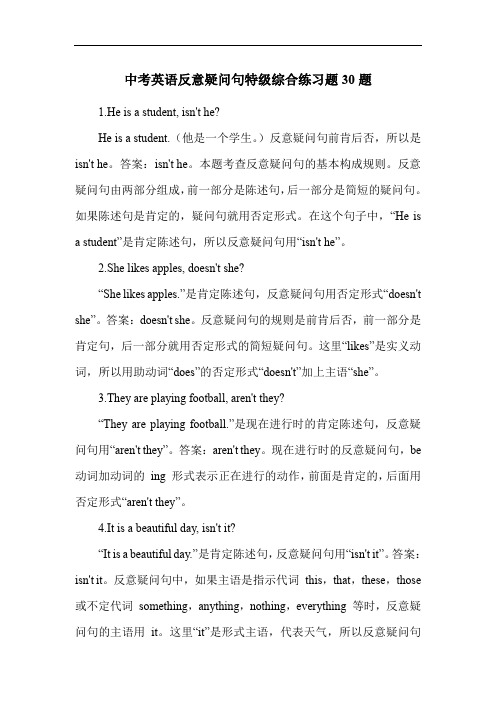
中考英语反意疑问句特级综合练习题30题1.He is a student, isn't he?He is a student.(他是一个学生。
)反意疑问句前肯后否,所以是isn't he。
答案:isn't he。
本题考查反意疑问句的基本构成规则。
反意疑问句由两部分组成,前一部分是陈述句,后一部分是简短的疑问句。
如果陈述句是肯定的,疑问句就用否定形式。
在这个句子中,“He isa student”是肯定陈述句,所以反意疑问句用“isn't he”。
2.She likes apples, doesn't she?“She likes apples.”是肯定陈述句,反意疑问句用否定形式“doesn't she”。
答案:doesn't she。
反意疑问句的规则是前肯后否,前一部分是肯定句,后一部分就用否定形式的简短疑问句。
这里“likes”是实义动词,所以用助动词“does”的否定形式“doesn't”加上主语“she”。
3.They are playing football, aren't they?“They are playing football.”是现在进行时的肯定陈述句,反意疑问句用“aren't they”。
答案:aren't they。
现在进行时的反意疑问句,be 动词加动词的ing 形式表示正在进行的动作,前面是肯定的,后面用否定形式“aren't they”。
4.It is a beautiful day, isn't it?“It is a beautiful day.”是肯定陈述句,反意疑问句用“isn't it”。
答案:isn't it。
反意疑问句中,如果主语是指示代词this,that,these,those 或不定代词something,anything,nothing,everything 等时,反意疑问句的主语用it。
初中反义疑问句详解及练习和答案
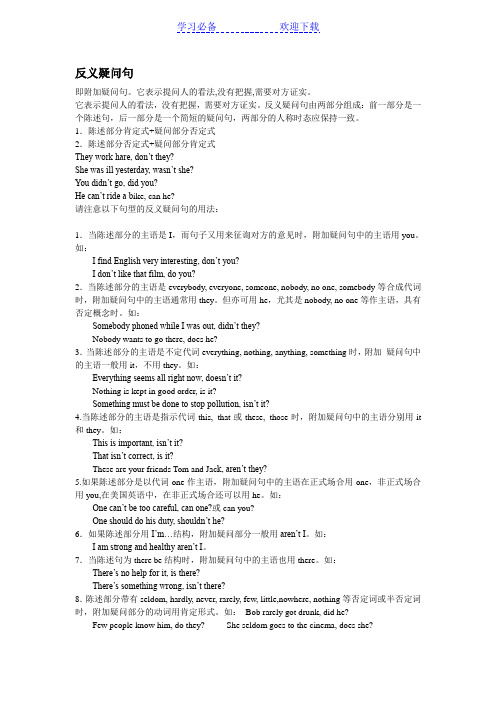
反义疑问句即附加疑问句。
它表示提问人的看法,没有把握,需要对方证实。
它表示提问人的看法,没有把握,需要对方证实。
反义疑问句由两部分组成:前一部分是一个陈述句,后一部分是一个简短的疑问句,两部分的人称时态应保持一致。
1.陈述部分肯定式+疑问部分否定式2.陈述部分否定式+疑问部分肯定式They work hare, don’t they?She was ill yesterday, wasn’t she?You didn’t go, did you?He can’t ride a b ike, can he?请注意以下句型的反义疑问句的用法:1.当陈述部分的主语是I,而句子又用来征询对方的意见时,附加疑问句中的主语用you。
如:I find English very interesting, don’t you?I don’t like that film, do you?2.当陈述部分的主语是everybody, everyone, someone, nobody, no one, somebody等合成代词时,附加疑问句中的主语通常用they。
但亦可用he,尤其是nobody, no one等作主语,具有否定概念时。
如:Somebody phoned while I was out, didn’t they?Nobody wants to go there, does he?3.当陈述部分的主语是不定代词everything, nothing, anything, something时,附加疑问句中的主语一般用it,不用they。
如:Everything seems all right now, doesn’t it?Nothing is kept in good order, is it?Something must be done to stop pollution, isn’t it?4.当陈述部分的主语是指示代词this, that或these, those时,附加疑问句中的主语分别用it 和they。
反义疑问句及中考题训练(含答案)
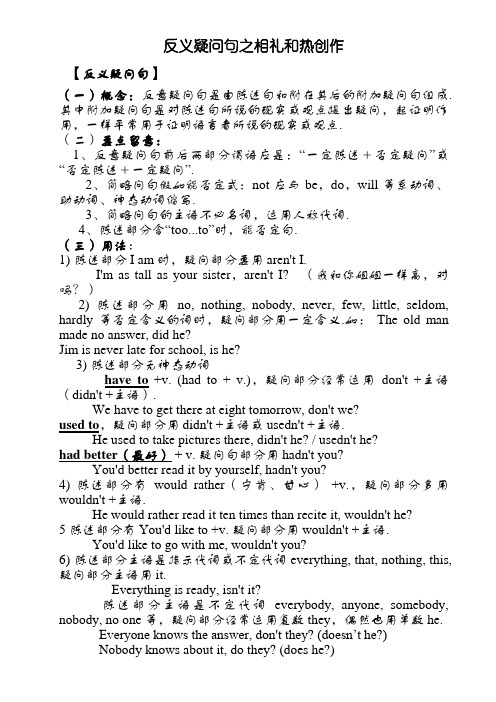
反义疑问句之相礼和热创作【反义疑问句】(一)概念:反意疑问句是由陈述句和附在其后的附加疑问句组成.其中附加疑问句是对陈述句所说的现实或观点提出疑问,起证明作用,一样平常用于证明语言者所说的现实或观点.(二)要点留意:1、反意疑问句前后两部分谓语应是:“一定陈述+否定疑问”或“否定陈述+一定疑问”.2、简略问句假如能否定式:not应与be,do,will等系动词、助动词、神态动词缩写.3、简略问句的主语不必名词,运用人称代词.4、陈述部分含“too...to”时,能否定句.(三)用法:1) 陈述部分I am时,疑问部分要用 aren't I.I'm as tall as your sister,aren't I?(我和你姐姐一样高,对吗?)2) 陈述部分用no, nothing, nobody, never, few, little, seldom, hardly等否定含义的词时,疑问部分用一定含义.如:The old man made no answer, did he?Jim is never late for school, is he?3) 陈述部分无神态动词have to+v. (had to + v.),疑问部分经常运用don't +主语(didn't +主语).We have to get there at eight tomorrow, don't we?used to,疑问部分用didn't +主语或 usedn't +主语.He used to take pictures there, didn't he? / usedn't he?had better(最好) + v. 疑问句部分用hadn't you?You'd better read it by yourself, hadn't you?4) 陈述部分有would rather(宁肯、甘心)+v.,疑问部分多用wouldn't +主语.He would rather read it ten times than recite it, wouldn't he?5 陈述部分有You'd like to +v. 疑问部分用wouldn't +主语.You'd like to go with me, wouldn't you?6) 陈述部分主语是指示代词或不定代词everything, that, nothing, this, 疑问部分主语用it.Everything is ready, isn't it?陈述部分主语是不定代词everybody, anyone, somebody, nobody, no one等,疑问部分经常运用复数they,偶然也用单数he.Everyone knows the answer, don't they? (doesn’t he?)Nobody knows about it, do they? (does he?)7) think引导的宾语从句:I don't think he is bright, is he?We believe she can do it better, can't she?B. 假如主语不是第一人称则疑问部分与主句绝对应构成反意疑问句He thought they were wrong, didn't he? (不克不及说weren't they?)8) 省往主语的祈使句的反意疑问句,疑问部分用will you.Don't do that again, will you??Let's go and listen to the music, shall we(或用shan't we)?Let us wait for you in the reading-room, will you (或won't you)?9) 陈述部分是"there be"结构的,疑问部分用there.There is something wrong with your watch, isn't there?There will not be any trouble, will there?10) 否定前缀不克不及视为否定词,其反意疑问句仍用否定方式.It is impossible, isn't it?He is not unkind to his classmates, is he?反义疑问句由两部分组成:前一部分是一个陈述句,后一部分是一个简短的疑问句,两部分的人称时态应坚持同等.主语一样平常词语附加疑问句中主语用和主语同等的主语,用主格.不定代词当陈述部分的主语是(1)everyone,no one, nobody 等时,后面的疑问句应暗示为:Everyone is in the classroom, aren't they? (基本不必单数,但也可用he)Nobody will go, will they?(2)everything,anything,nothing,something时,附加疑问句中主语一样平常用 it 不必 they(3)this,that,或those,these时,附加疑问句中主语用it和they.特殊句型(1)当陈述部分有never,seldom, hardly,few,little,barely, scarcely, nothing 等否定意义的词时,后面的反意疑问句则为一定方式:There are few apples in the basket, are there?He can hardly swim, can he?They seldom come late, do they?(2)当陈述部分含有否定意思的词是unhappy,dislike,unfriendly等含有否定词缀的派生词,也就是有un-前缀、-less后缀等含有词缀而意思否定的词,当做一定句处理,疑问部分要用否定方式.如:He looks unhappy,doesn't he?他看上往不高兴,不是吗?The girl dislikes history,doesn't she?这女孩不喜欢历史,不是吗?含有think, believe, suppose, imagine, expect等动词后接宾语从句构成的主从复合句在构成反意疑问句时,视状况分歧有两种分歧的构成方式.(1)当主句的主语为第一人称时,其后的简短问句应与从句相同等.例如:I expect our English teacher will be back this weekend, won't she/he? We suppose you have finished the project, haven't you?值得留意的是,当这些动词后接的宾语从句的否定转移到主句时,其仍属否定句,故其后的简短问句运用一定式,而非否定式.例如:I don't believe that he can translate this book, can he?Wedon't imagine the twins have arrived, have they?此类句子的回答同"前否后肯"型反意疑问句一样,如上述后一个句子,若双胞胎曾经到了,则回答为"Yes, they have.";若尚未到达,运用"No, they haven't.".(2)当主句的主语为第二、三人称时,其后的简短问句则应与主句相同等(此时,否定只看主句,与从句有关...).例如:Your sister supposes she needs no help, doesn't she?You thought they could have completed the project, didn't you?They don't believe she's an engineer, do they?She doesn't expect that we are coming so soon, does she?(3)但假如主句的时态是过往时等等,疑问句应和主句的人称时态坚持同等.陈述部分有had better,或其中的have暗示完成时态时,疑问句运用hadn’t等扫尾:You’d better get up early, hadn’t you?其他状况句中有have时疑问句运用don't等扫尾如have暗示“有”的时分,有两种方式:-He has two sisters,doesn't he?-He doesn't have any sisters,does he?当陈述部分是祈使句时,疑问句要根据语气来表达当扫尾是Let‘s时,一定要用shall we.别的都用will you(包含Let us)不管一定否定Let’s go out for a walk, shall we?Let us go out for a walk, will you?Let me help you,may I?Turn on the radio, will you?There be 句型中,反义疑问部分必须为be 动词 + thereThere are some apples in the basket, aren't there?There isn't any milk left, is there?当陈述部分无神态动词must,问句有4种状况:(1)mustn't暗示“禁止,不成,不必”时,附加问句通常要用must.You mustn't stop your car here,must you? 你不克不及把车停在这地方,晓得吗?(2)must暗示“有必要”时,附加问句通常要用needn't.They must finish the work today,needn't they? 他们今天要完成这项工作,是吗?(3)当must用来暗示对如今的状况进行揣测时,问句通常要根据must后面的动词采取相应的方式.He must be good at English,isn't he? 他英语一定学得很好,是吗?(4)当must+have done暗示对过往的状况进行揣测(一样平常句中有明白的过往工夫状语),问句要根据陈述部分谓语的状况用“didn't+主语”或“wasn't/weren't+主语”;假如强调动作的完成(一样平常没有明白的过往工夫状语),问句要用“haven't/hasn't+主语”. She must have read the novel last week,didn't she? 她上星期一定读了这本小说,是吗?You must have told her about it,haven't you? 你一定把这事告诉她了,是吗?回答反意疑问句的回答用yes,no,但是,回答意思相反,当陈述部分能否定方式时,回答要按现实.如:They don’t work hard, do they? 他们不太积极工作,是吗?Yes, they do. 不,他们工作积极./No, they don’t. 对,他们工作不积极当陈述部分为否定式,反意疑问句为一定式时,其回答每每与汉语纷歧致,需特别惹起留意:"It isn’t cheap, is it?" "Yes, it is." “它不低价吧?”“不,很低价.” "He doesn’t love her, does he?" "No, he doesn’t."“他不爱她,是吗?”“是的,他不爱她.”此时,"Yes"即不,对后面"It isn't cheap."的否定.当陈述部分为一定式,反意疑问句为否定式时,其回答一样平常不会形成困难,一样平常只需照状况回答即可:"It’s new, isn’t it?" "Yes, it is." “是新的,对吗?”“对,是新的.” "He wants to go, doesn’t he?" "No, he doesn’t." “他想往,对吗?”“不,他不想往.”此时,"No"即是,对后面"It's new."的一定.回答反意疑问句通常应根据实践状况来确定,“It is a beautiful flower,isn't it?” “It isn't a beautiful flower,is it?”一定均为“Yes,it is."否定为“No,it isn't."快速记忆表Wishmay +主语no,nothing,nobody,never,few, seldom, hardly,一定含义rarely, little等否定含义的词ought to(一定的)shouldn't/ oughtn't +主语have to+v.(had to+v.)don't +主语(didn't +主语)used todidn't +主语或 usedn't +主语had better + v.hadn't youwould rather + v.wouldn't +主语you'd like to + v.wouldn't +主语must根据实践状况而定感叹句中be +主语Neither…nor, either…or 连接的并列主语根据其实践逻辑意义而定指示代词或不定代词 everything,that,nothing,this主语用it并列复合句谓语根据邻近从句的谓语而定定语从句,宾语从句的主从复合句根据主句的谓语而定think,believe,expect, suppose,imagine等引导与宾语从句绝对应的从句everybody,anyone, somebody,nobody,no one复数they, 单数he神态动词dare或needneed (dare ) +主语dare, need 为实义动词do +主语省往主语的祈使句will you?Let's 扫尾的祈使句Shall we?Let us 扫尾的祈使句Will you?there be相应的谓语动词+there(省略主语代词)否定前缀不克不及视为否定词仍用否定方式must表"揣测根据其揣测的状况来确定反意疑问句1. Linda ate nothing this morning, ___? A. d idn’t she B. was she C. did she D. wasn’t she2. There’s hardly___ milk in the bottle, _____there? A. no, isn’t B. some, is C. little, isn’t D. any, is3. He has never ridden a horse before, ___? A. does he B. has he C. hasn’t he D. doesn’t he4. —He seldom came here, _____? —Yes sir. A. didn’t he B. does he C.doesn’t he D. did he 5. Everything seems all right, _____ ? A. does it B. don’t they C. won’t it D. doesn’t it 7. One can’t be too modest, can _____ ? A. one B. he C. it D. we 8. No one failed in the exam, _____ ?A. was heB. did oneC. did theyD. didn’t he 10. Neither you nor I am a artist, _____ ? A. am I B. aren’t we C. are we D. a m n’t I 11. He can’t be her father, _____ he? A. is B. isn’t C. can D. can’t 12. They have no time to visit the muse um, _____? A. do they B. haven’t they C. don’t they D. will they 14. You’d better go at once, _____ you? A. hadn’t B. did C. didn’t D. don’t 15. You’d rather work than play, _____ you? A. hadn’t B. wouldn’t C. didn’t D. mustn’t 16. You dare not do that, _____ you? A. don’t B. do C. dare D. daren’t 18. He dislikes the two subjects, _____ he? A. does B. doesn’t C. is D. isn’t 19. These tools are useless now, _____ ? A. are they B. aren’t they C. is it D. isn’t it 20. He used to get up at 6:30, _____ he? A. di dn’t he B. did he C. used he D. wouldn’t he 22. He ought to win the first prize, _______ he? A. mustn’t B. oughtn’t C. shouldn’t D. Both B and C. 23. Let’s go there by bus, ___?A. will youB. shall weC. don’t youD. will you 24. Let us go to play footbal l, ___? A. will you B. shall we C. do we D. are we 25. Don’t forget to give Polly some food and change her water, ___? A. will you B. shall we C. won’t you D. do you 26. —Let’s go shopping this afternoon, _____? —All right. A. will we B. shall we C. don’t we D. are we 27. —Pass me the dictionary, _____? — Yes, with pleasure. A. would you B. will you C. won’t you D. wouldn’t you 30. There is little water in the glass, ____? A. isn’t there B. isn’t it C. is it D. is there 32. There won’t be any concert this Saturday evening, _____ ? A. will there not B. will there C. is there D. won’t 33. —I guess she taught herself Japanese, ______? —Yes. A. don’t I B. did she C. do I D. didn’t she 34. I don’t believe you are right, _____ ? A. are you B. do you C. won’t you D. do 35. She doesn’t think that Tom sings best in the class, _____ ? A. does she B. doesn’t she C. does he D. doesn’t he 37. I know you didn’t want to hurt me, _____ ? A. did you B. didn’t you C. do I D. don’t I 38. If my father were here he would be very happy, _____ ? A. weren’t he B. were he C. wouldn’t he D. would heKey: 1—5 CDBDD 6—10 BACDC 11—15 AABAB 16—20 CCBBA 21—25CDBAA 26—30 BBBAD 31—35 BBDAA 36—38 AACBritish newspapers are much smaller than they used to be and their readers are often in a hurry ,so newspapermen write as few words as possible .They tell their readers at once what happened ,where ,when and how it happened and what was the result : how many people were killed ,what change was done and so on .Readers want the fact(现实) set out as fully and accurately as possible .Readers are also interested in thepeople who have seen the accident. So a newspaperman always likes to get some information (信息)from someone who was there, which can be given in the person’s own words .Because he can use only a few words ,the newspaperman must choose those words carefully ,every one must be effective(无效). Instead of “he called out in a loud voice”, he writes” he shouted”; instead of “the loose stones rolled noisily down the side of the mountain”, he will write” they thundered down the mountainside”. Because many of the readers aren’t very clever, and most of them are in a hurry.1.From the text, we learn that newspapermen write as few words aspossible ,becausereaders___.A. want to know more about the newsB.take no interest in what has happenedC.have no time to read the news carefullyD.pay much attention to the result2.The underlined word”one”3.Which of the following would best complete the text ?A. he will keep his writing shortB. he won’t care about his writingC. he will give nothing but informationD. he won’t make his writing good enough.4.In what way do you think British newspapers have become smaller?A. In a page size.B. In number of readers.C. In number of pages.D. In number of copies5.Which of the following is true?A. Readers are not satisfied with the short news.B. Not many people have time to read the long articles in newspapers.C. Readers find the language of the newspapers exciting.D. Newspapermen try to report as fully as possible.CABABIt was getting dark. Some children and two Canadian women were still________on the ice near a big hotel. They were having a good time.Suddenly the ice_________. One of the boys fell into the water. The children shouted, “Help! Help!” They didn’t know_________to do. The two Canadian friends heard__________and skated over to get the boy out of the water.The ice was__________. The two Canadians fell into the water, too. But they tried their best to_________the little boy. They knew they must be_________. If they didn’t push him up onto the ice, he would soon die.Many people ran over to_________. Some of them had ropes and poles(绳和竹竿). A young man jumped into the water to wave the_________people.The boy and the two Canadian women were out of water at last. One of the women didn’t feel well. She was sent to the_________at once. But she felt very happy because the boy was safe.top around higher thinking foreign different even walking look pleasure。
反义疑问句与中考题训练含答案
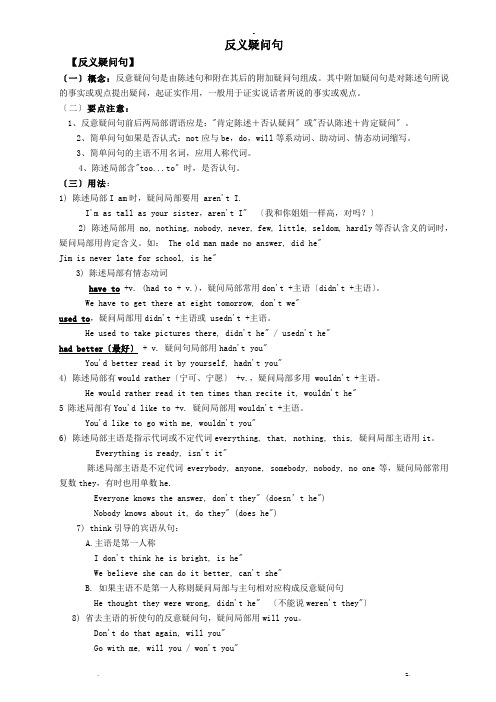
反义疑问句【反义疑问句】〔一〕概念:反意疑问句是由陈述句和附在其后的附加疑问句组成。
其中附加疑问句是对陈述句所说的事实或观点提出疑问,起证实作用,一般用于证实说话者所说的事实或观点。
〔二〕要点注意:1、反意疑问句前后两局部谓语应是:"肯定陈述+否认疑问〞或"否认陈述+肯定疑问〞。
2、简单问句如果是否认式:not应与be,do,will等系动词、助动词、情态动词缩写。
3、简单问句的主语不用名词,应用人称代词。
4、陈述局部含"too...to〞时,是否认句。
〔三〕用法:1) 陈述局部I am时,疑问局部要用 aren't I.I'm as tall as your sister,aren't I" 〔我和你姐姐一样高,对吗?〕2) 陈述局部用 no, nothing, nobody, never, few, little, seldom, hardly等否认含义的词时,疑问局部用肯定含义。
如: The old man made no answer, did he"Jim is never late for school, is he"3) 陈述局部有情态动词have to +v. (had to + v.),疑问局部常用don't +主语〔didn't +主语〕。
We have to get there at eight tomorrow, don't we"used to,疑问局部用didn't +主语或 usedn't +主语。
He used to take pictures there, didn't he" / usedn't he"had better〔最好〕 + v. 疑问句局部用hadn't you"You'd better read it by yourself, hadn't you"4) 陈述局部有would rather〔宁可、宁愿〕 +v.,疑问局部多用 wouldn't +主语。
中考英语反义疑问句专项练习题

中考英语反义疑问句专项练习题中考英语反义疑问句专项练习题反义疑问句即附加疑问句。
它表示提问人的'看法,没有把握,需要对方证实。
为了帮助大家更好地理解反义疑问句的用法,店铺为大家带来中考英语反义疑问句的专项练习题,希望能对大家有帮助!一、选择题1、My mother has to stay at home to look after my grandma, _______?A. hasn’t sheB. hasn’t my motherC. doesn’t sheD.doesn’t my mother2、 He has many friends at school, _____?A. has heB. does heC. doesn’t heD. isn’t he3、They have never been to America, _______?A. have theyB. haven’t theyC. don’t theyD. do they4、There is little milk in the glass, _______?A. isn’t itB. isn’t thereC. is thereD. is it5、I don’t think he must be sleepy, _______?A. mustn’t heB. do IC. must heD. is he6、It rained hard last night,______?A. does itB. did itC. doesn’ t itD. didn’ t it7、They haven’t found the MH 370, ______________?A. have theyB. haven’t theyC. do theyD. don’t they8、He’s given an important report on the work of the government,________?A.isn’t heB.is heC.hasn’t heD.has he9、Let’s go to the cinema, ____?A. will youB. shall weC. don’t weD. do we10、Lucy didn’t come to school yesterday, ____?A. did sheB. didn’t sheC. dos sheD. doesn’t she11、There are a few people in the room, ____?A. are thereB. aren’t thereC. are theyD. aren’t the y12、He’s never been to a foreign country, ________?A. isn’t heB. is heC. has heD. hasn’t he13、Come here a moment, ____?A. will youB. shall youC. shall weD. don’t you14、They have never been to America, _______?A. have theyB. haven’t theyC. don’t theyD. do they15、She’s already back., _______?A doesn’t sheB isn’t sheC hasn’t sheD has she16、He’s never been to the Great Wall, __________?A. is heB. was heC. wasn’t heD. has he17、–There is little milk in the milk bag, ________ there?A. i sB. isn’tC. aren’t18、They seldom think about the people, __________?A. do theyB. don’t theyC. are theyD. aren’t they19、 Jim never copies your homework, _____ ?A. does JimB. doesn’t heC. does he20、Tommy has a pen, ?A. hasn’t heB. isn’t heC. doesn’t heD. wasn’t he21、 Alice had a wonderful time yesterday, ______?A. hadn’t sheB. wasn’t sheC. didn’t sheD. wouldn’t she22、The tall man over there is our new English teacher, _________?A. is heB. is thereC. isn’t heD. isn’t there23、―He har dly has any friends to play with , _____ he?―_______! That’s why he feels lonely from time to time.A. hasn’t, NoB. doesn’t, YesC. does, YesD. does, No24、----He’s never put his effort into his study before, he?---- . He does very badly in all his subjects.A. hasn’t, YesB. is, NoC. has, YesD. has, No25、He never goes to Yancheng, ______?A. doesn’t heB. is heC. isn’t heD. does he26、-----He’s never been to Canada before, _____? -----Sorry, I don’t know.A. is heB. has heC. isn’t heD. hasn’t h e27、—He hardly caught the train yesterday afternoon, he?— , because he was caught in the rain.A. did; Yes, he didB. didn’t; Yes, he didC. did; No, he didn’tD. didn’t; No, he didn’t28、—He’s never told lies,_________ he ? —__________,he’s an honest boy.A. is , NoB. isn’t , YesC. has , NoD. hasn’t , Yes29、They hardly hurt themselves in the accident last night, _________?A. don’t theyB. didn’t theyC. did theyD. do they30、--Let’s go shopping, _____?--Ok, let’s go.A. do youB. don’t youC. will youD. shall we31、The boy hardly ever goes swimming ,_____ _____ ?A doesn’t heB does heC has heD hasn’t he32、Don’t forget to give my dog some food and change her water, ______?A.will youB.do youC.won’t youD.shall we33、He has never been to Beijing, ______?A. hasnt heB. has heC. doesnt he34、 There is little left, ________ ?A. is itB. isn’t itC. isn’t thereD. is there35、You have to keep quiet while watching the film, _______ you?A. haven’tB. don’tC. didn’tD. will36、 This book cost her twenty yuan , ?A. didn’t itB. doesn’t itC. did itD. does it37、–There are always many volunteers in great events, ________?--Yes. Many hands make light work.A. are thereB. aren’t thereC. aren’t theyD. are they38、Ellen seldom goes swimming in the river alone, ____________ ?A. does heB. doesn’t heC. does sheD. doesn’t she39、—Rose, we will start at six tomorrow morning. Dont be late,______?—_______,Ill be there on timeA.wont you;Yes,I willB.will you;Yes,I willC.will you;No,I wontD.wont you,No,I wont40、I don’t think dropping litter is allowed in Yellow River Park, ________?A. do IB. is itC. isn’t itD. don’t I参考答案一、选择题1、C2、C3、A4、C5、D6、D7、A9、B10、A11、B12、C13、A14、A15、B16、D17、A18、A19、C。
初中反义疑问句详解及练习和答案

初中反义疑问句详解及练习和答案反义疑问句即附加疑问句。
它表示提问人的看法,没有把握,需要对方证实。
它表示提问人的看法,没有把握,需要对方证实。
反义疑问句由两部分组成:前一部分是一个陈述句,后一部分是一个简短的疑问句,两部分的人称时态应保持一致。
1.陈述部分肯定式+ 疑问部分否定式2.陈述部分否定式+ 疑问部分肯定式They work hare, don ' t they?She was ill yesterday, wasn ' t she?You didn ' t go, did you?He can ' t ride aikbe, can he? 请注意以下句型的反义疑问句的用法:1当陈述部分的主语是I,而句子又用来征询对方的意见时,附加疑问句中的主语用you。
如:I find English very interesting, don 't you?I don 't like that film, do you?2. 当陈述部分的主语是everybody, every one, some one, no body, no one, somebody 等合成代词时,附加疑问句中的主语通常用they。
但亦可用he,尤其是nobody, no one 等作主语,具有否定概念时。
如:Somebody phoned while I was out, didn 't they?Nobody wants to go there, does he?3. 当陈述部分的主语是不定代词e verything, nothing, anything, something 时,附加疑问句中的主语一般用it,不用they。
如:Everything seems all right now, doesn 't it?Nothing is kept in good order, is it?Something must be done to stop pollution, isn 't it?4. 当陈述部分的主语是指示代词this, that 或these, those 时,附加疑问句中的主语分别用it和they。
2010年中考英语反意疑问句专项指导练习整理1s
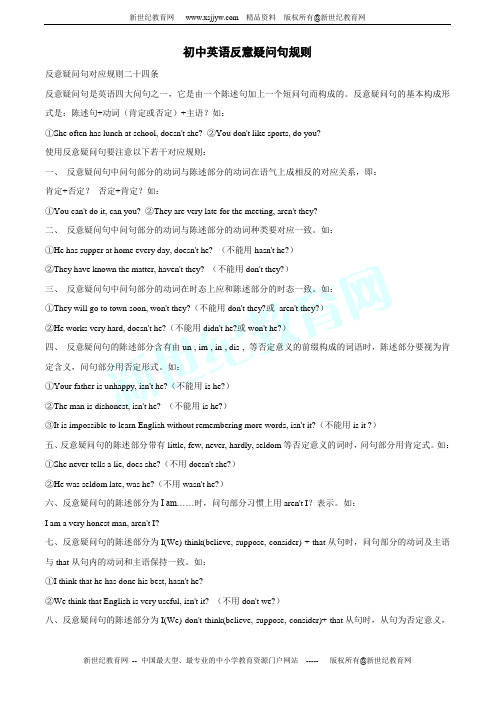
初中英语反意疑问句规则反意疑问句对应规则二十四条反意疑问句是英语四大问句之一,它是由一个陈述句加上一个短问句而构成的。
反意疑问句的基本构成形式是:陈述句+动词(肯定或否定)+主语?如:①She often has lunch at school, doesn't she? ②You don't like sports, do you?使用反意疑问句要注意以下若干对应规则:一、反意疑问句中问句部分的动词与陈述部分的动词在语气上成相反的对应关系,即:肯定+否定?否定+肯定?如:①You can't do it, can you? ②They are very late for the meeting, aren't they?二、反意疑问句中问句部分的动词与陈述部分的动词种类要对应一致。
如:①He has supper at home every day, doesn't he? (不能用hasn't he?)②They have known the matter, haven't they? (不能用don't they?)三、反意疑问句中问句部分的动词在时态上应和陈述部分的时态一致。
如:①They will go to town soon, won't they?(不能用don't they?或aren't they?)②He works very hard, doesn't he?(不能用didn't he?或won't he?)四、反意疑问句的陈述部分含有由un-, im-, in-, dis-, 等否定意义的前缀构成的词语时,陈述部分要视为肯定含义,问句部分用否定形式。
如:①Your father is unhappy, isn't he?(不能用is he?)②The man is dishonest, isn't he? (不能用is he?)③It is impossible to learn English without remembering more words, isn't it?(不能用is it ?)五、反意疑问句的陈述部分带有little, few, never, hardly, seldom等否定意义的词时,问句部分用肯定式。
中考英语反义疑问句讲解及练习题
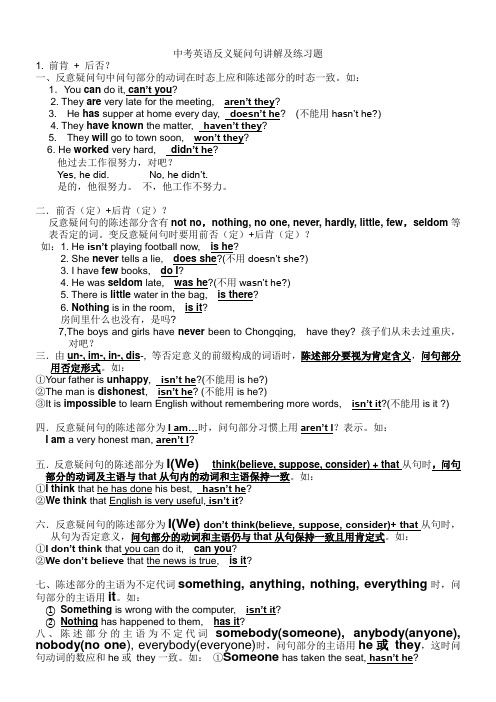
中考英语反义疑问句讲解及练习题1. 前肯+ 后否?一、反意疑问句中问句部分的动词在时态上应和陈述部分的时态一致。
如:1.You can do it, can’t you?2. They are very late for the meeting, aren’t they?3. He has supper at home every day, doesn’t he? (不能用hasn’t he?)4. They have known the matter, haven’t they?5. They will go to town soon, won’t they?6. He worked very hard, did n’t he?他过去工作很努力,对吧?Yes, he did. No, he didn’t.是的,他很努力。
不,他工作不努力。
二.前否(定)+后肯(定)?反意疑问句的陈述部分含有not no,nothing, no one, never, hardly, little, few,seldom等表否定的词。
变反意疑问句时要用前否(定)+后肯(定)?如:1. He isn’t playing football now, is he?2. She never tells a lie, does she?(不用doesn’t she?)3. I have few books, do I?4. He was seldom late, was he?(不用wasn’t he?)5. There is little water in the bag, is there?6. Nothing is in the room, is it?房间里什么也没有,是吗?7,The boys and girls have never been to Chongqing, have they? 孩子们从未去过重庆,对吧?三.由un-, im-, in-, dis-, 等否定意义的前缀构成的词语时,陈述部分要视为肯定含义,问句部分用否定形式。
反义疑问句及中考题训练(含标准答案).doc
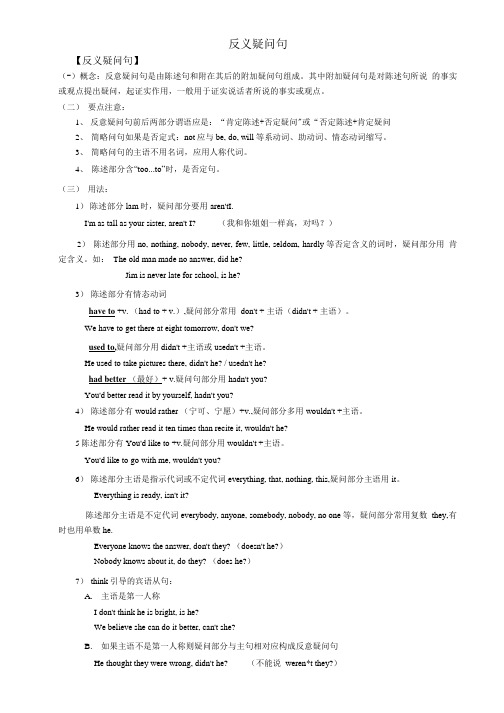
反义疑问句【反义疑问句】(-)概念:反意疑问句是由陈述句和附在其后的附加疑问句组成。
其中附加疑问句是对陈述句所说的事实或观点提出疑问,起证实作用,一般用于证实说话者所说的事实或观点。
(二)要点注意:1、反意疑问句前后两部分谓语应是:“肯定陈述+否定疑问"或“否定陈述+肯定疑问2、简略问句如果是否定式:not应与be, do, will等系动词、助动词、情态动词缩写。
3、简略问句的主语不用名词,应用人称代词。
4、陈述部分含“too...to”时,是否定句。
(三)用法:1)陈述部分lam时,疑问部分要用aren'tI.I'm as tall as your sister, aren't I? (我和你姐姐一样高,对吗?)2)陈述部分用no, nothing, nobody, never, few, little, seldom, hardly等否定含义的词时,疑问部分用肯定含义。
如:The old man made no answer, did he?Jim is never late for school, is he?3)陈述部分有情态动词have to +v. (had to + v.),疑问部分常用don't + 主语(didn't + 主语)。
We have to get there at eight tomorrow, don't we?used to,疑问部分用didn't +主语或usedn't +主语。
He used to take pictures there, didn't he? / usedn't he?had better (最好)+ v.疑问句部分用hadn't you?You'd better read it by yourself, hadn't you?4)陈述部分有would rather (宁可、宁愿)+v.,疑问部分多用wouldn't +主语。
中考英语语法复习反义疑问句

she ?/ hasn’t she?
2.do 助动词(用的 多)
2.have “生病,吃 she had a cold,didn’t she ? 根据实义动词选 喝玩乐,实义动 Tom has a bath,doesn’t he? 择对应的助动词
词”以及have to
英语专项:反义疑问句
have的用法
can’t they
You have never been to Beijing, ---Yes, I have. /No, I haven’t.
have you ?
34. ---Mr. Fat has few friends here, does he
?
---Yes, he does. /No, he doesn’t.
英语专项:反义疑问句 35 ---There is little milk in the bottle, is there ?
---Yes, there is. /No, there isn’t.
英语专项:反义疑问句
5.陈述部分含有否定前缀im-,dis-,un-和less等否 Alice is unhappy, isn’t 定后缀构成的派生词,附加疑问用否定形式。 she?
6.陈述部分是不定代词(物体)
Nothing is wrong with
something/anything/ everything/nothing等,疑问 the computer, is it?
反义疑问句用 had 前肯后否,
前否后肯。
英语专项:反义疑问句
4) 并列复句反意疑问句
反意疑问句的疑问部分一般与最接近的分句的主 、谓语保持一致。为了便于记忆,我们称之为就 近一致原则。
中考英语反义疑问句讲解及习题!
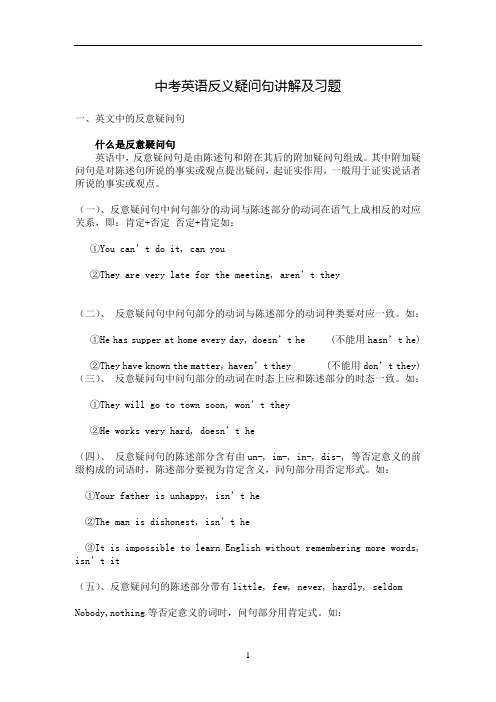
中考英语反义疑问句讲解及习题一、英文中的反意疑问句什么是反意疑问句英语中,反意疑问句是由陈述句和附在其后的附加疑问句组成。
其中附加疑问句是对陈述句所说的事实或观点提出疑问,起证实作用,一般用于证实说话者所说的事实或观点。
(一)、反意疑问句中问句部分的动词与陈述部分的动词在语气上成相反的对应关系,即:肯定+否定否定+肯定如:①You can’t do it, can you②They are very late for the meeting, aren’t th ey(二)、反意疑问句中问句部分的动词与陈述部分的动词种类要对应一致。
如:①He has supper at home every day, doesn’t he (不能用hasn’t he)②They have known the matter, haven’t they (不能用don’t they) (三)、反意疑问句中问句部分的动词在时态上应和陈述部分的时态一致。
如:①They will go to town soon, won’t they②He works very hard, doesn’t he(四)、反意疑问句的陈述部分含有由un-, im-, in-, dis-, 等否定意义的前缀构成的词语时,陈述部分要视为肯定含义,问句部分用否定形式。
如:①Your father is unhappy, isn’t he②The man is dishonest, isn’t he③It is impossible to learn English without remembering more words, isn’t it(五)、反意疑问句的陈述部分带有little, few, never, hardly, seldomNobody,nothing等否定意义的词时,问句部分用肯定式。
如:①She never tells a lie, does she (不用doesn’t she)②He was s eldom late, was he (不用wasn’t he)(六)、反意疑问句的陈述部分为I am……时,问句部分习惯上用aren’t I 表示。
初中反义疑问句详解及练习和答案

反义疑问句即附加疑问句。
它表示提问人的看法,没有把握,需要对方证实。
它表示提问人的看法,没有把握,需要对方证实。
反义疑问句由两部分组成:前一部分是一个陈述句,后一部分是一个简短的疑问句,两部分的人称时态应保持一致。
1.陈述部分肯定式+疑问部分否定式2.陈述部分否定式+疑问部分肯定式They work hare, don’t they?She was ill yesterday, wasn’t she?You didn’t go, did you?He can’t ride a b ike, can he?请注意以下句型的反义疑问句的用法:1.当陈述部分的主语是I,而句子又用来征询对方的意见时,附加疑问句中的主语用you。
如:I find English very interesting, don’t you?I don’t like that film, do you?2.当陈述部分的主语是everybody, everyone, someone, nobody, no one, somebody等合成代词时,附加疑问句中的主语通常用they。
但亦可用he,尤其是nobody, no one等作主语,具有否定概念时。
如:Somebody phoned while I was out, didn’t they?Nobody wants to go there, does he?3.当陈述部分的主语是不定代词everything, nothing, anything, something时,附加疑问句中的主语一般用it,不用they。
如:Everything seems all right now, doesn’t it?Nothing is kept in good order, is it?Something must be done to stop pollution, isn’t it?4.当陈述部分的主语是指示代词this, that或these, those时,附加疑问句中的主语分别用it 和they。
初中英语反义疑问句归纳及练习

但当陈述部分是第一人称(I/we) + think, believe,
suppose, expect这类动词时,附加疑问部分则 往往与从句中的主语和谓语动词保持对应关系, 但要注意否定的转移。 I suppose that he’s serious ,isn’t he I don’t think she cares, does she I don’t think that you can do it, can you
5. Let us do the jobs ourselves,w__il_l _y_o_u_/w__o_n_’t_y_o_u_ 6. There were few people there, w__e_re__th__e_re___ 7. You need to have a good dictionary,__d_o_n_’t__yo__u 8. There used to be an old stone bridge across
反意疑问句的陈述部分为非第一人称主语 + think(believe, suppose, consider) + that从句时,问句部分的动词和主语与陈述部分的主 句动词和主语保持一致。如:
①They all think that English is very important, don’t they (不用isn’t it)
如果陈述部分的否定词带有否定前缀,则,该 陈述部分作肯定处理,附加疑问部分一般仍用否 定形式。如:
He was unsuccessful, wasn’t he Tom dislikes the book, doesn’t he
初中反义疑问句详解及练习和答案
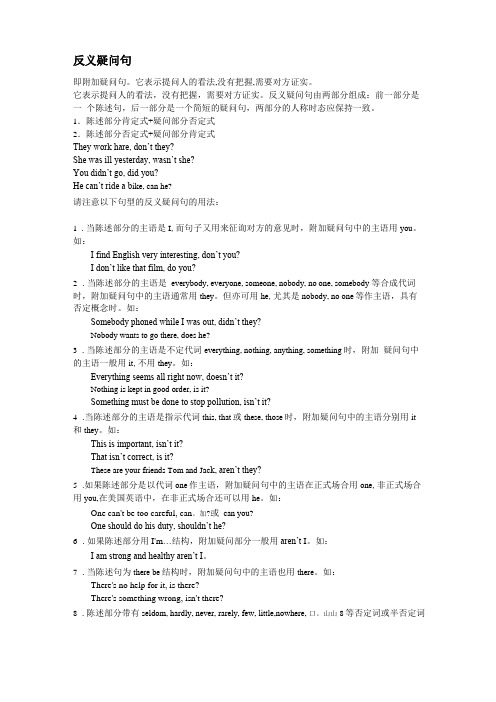
反义疑问句即附加疑问句。
它表示提问人的看法,没有把握,需要对方证实。
它表示提问人的看法,没有把握,需要对方证实。
反义疑问句由两部分组成:前一部分是一个陈述句,后一部分是一个简短的疑问句,两部分的人称时态应保持一致。
1.陈述部分肯定式+疑问部分否定式2.陈述部分否定式+疑问部分肯定式They work hare, don’t they?She was ill yesterday, wasn’t she?You didn’t go, did you?He can’t ride a b ike, can he?请注意以下句型的反义疑问句的用法:1.当陈述部分的主语是I,而句子又用来征询对方的意见时,附加疑问句中的主语用you。
如:I find English very interesting, don’t you?I don’t like that film, do you?2.当陈述部分的主语是everybody, everyone, someone, nobody, no one, somebody 等合成代词时,附加疑问句中的主语通常用they。
但亦可用he,尤其是nobody, no one等作主语,具有否定概念时。
如:Somebody phoned while I was out, didn’t they?Nobody wants to go there, does he?3.当陈述部分的主语是不定代词everything, nothing, anything, something时,附加疑问句中的主语一般用it,不用they。
如:Everything seems all right now, doesn’t it?Nothing is kept in good order, is it?Something must be done to stop pollution, isn’t it?4.当陈述部分的主语是指示代词this, that或these, those时,附加疑问句中的主语分别用it 和they。
反义疑问句专题训练

反义疑问句专题训练反意疑问句由两部分构成:前一部分是陈述句,后一部分是一个简短的疑问句,前后两部分在时态、人称和数上都要保持一致。
1.肯定式陈述部分+否定式疑问部分He looks like his father, doesn' t he ?他长的像他爸爸,不是吗?She was ill yesterday, wasn ' t she ?她昨天病了,不是吗?2.否定式陈述部分+肯定式疑问部分He doesn' t need to work so late , does he?他不需要工作到那么晚,对吗?He can' t ride a bike , can he?他不会骑自行,是吗?规则1.前肯后否,前否后肯。
2.表示否定的词hardly, seldom, little, few等3.解题技巧回答部分:看后面,根据事实回答,符合事实回答用yes,不符合用no。
例1:Your brother’s never careless, ______ he?--__________, he often makes mistakes.A. has, YesB. has, NoC. is, YesD. is, No解析:前半句“Your brother’s never careless”是否定句,故反义部分“______ he”用肯定。
答句:“he often makes mistakes.”表明他确实粗心,故答句用Yes, my brother is careless.答案:C中考复习反义疑问句专项练习1.--- They have never seen the film, they?--- Yes, they have.A. haveB. haven’tC. doD. don’t2.There’s little important news in the newspaper today, ______?A. isn’t thereB. is thereC. is itD. are there3.I don’t think the newly-directed film by Zhaowei is as interesting as people say, _______?A. do youB. isn’t itC. is itD. don’t you 4.-----You are going to visit the Great Wall,_____?-----That’s right.A. are youB. aren’t youC. don’t you5.---You never have sweet snacks, do you?---________. Though I know they’re bad for our health.A. YesB. NoC. Yes, I don’tD. No, I do6.You went to the concert yesterday, ____ ?A. do youB. don’t youC. did youD. didn’t you 7.—There is little water left in the bottle, ______?—No, we need to buy some more before we run out of it.A. is thereB. isn’t thereC. is itD. isn’t it 8.——You aren’t a stranger, are you?——, don’t you remember me at the school gate ten minutes ago?A. Yes, to seeB. No, seeingC. No, sawD. Yes, seeing9.You can hardly see anything in the dark room, _____?A. can’tB. can youC. can’t weD. can we参考答案1-9A B C B A D A B1.A【解析】试题分析: 反义疑问句一般遵循前肯定则后否定,前否定则后肯定,疑问部分时态,人称要与前文保持一致。
中考英语 反意疑问句 (带练习题)
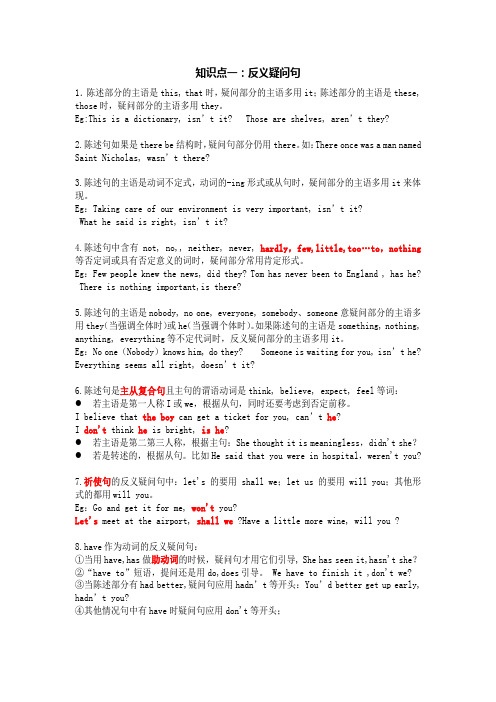
知识点一:反义疑问句1.陈述部分的主语是this, that时,疑问部分的主语多用it;陈述部分的主语是these, those时,疑问部分的主语多用they。
Eg:This is a dictionary, isn’t it? Those are shelves, aren’t they?2.陈述句如果是there be结构时,疑问句部分仍用there。
如:There once was a man named Saint Nicholas, wasn’t there?3.陈述句的主语是动词不定式,动词的-ing形式或从句时,疑问部分的主语多用it来体现。
Eg:Taking care of our environment is very important, isn’t it?What he said is right, isn’t it?4.陈述句中含有not, no,, neither, never, hardly,few,little,too…to,nothing等否定词或具有否定意义的词时,疑问部分常用肯定形式。
Eg:Few people knew the news, did they? Tom has never been to England , has he?There is nothing important,is there?5.陈述句的主语是nobody, no one, everyone, somebody、someone意疑问部分的主语多用they(当强调全体时)或he(当强调个体时)。
如果陈述句的主语是something, nothing, anything, everything等不定代词时,反义疑问部分的主语多用it。
Eg:No one(Nobody)knows him, do they? Someone is waiting for you, isn’t he? Everything seems all right, doesn’t it?6.陈述句是主从复合句且主句的谓语动词是think, believe, expect, feel等词:●若主语是第一人称I或we,根据从句,同时还要考虑到否定前移。
中考英语反意疑问句单选题50题(含答案)

中考英语反意疑问句单选题50题(含答案)1.She is a student, isn't she?A.is sheB.isn't sheC.does sheD.doesn't she答案:B。
反意疑问句遵循“前肯后否,前否后肯”的原则。
本题前半句是肯定句,所以后半句用否定形式,且前半句中有be 动词is,后半句也用is 的否定形式isn't,主语不变还是she。
A 选项与前半句一样是肯定形式,错误;C 和D 选项助动词使用错误。
2.He likes apples, doesn't he?A.does heB.doesn't heC.is heD.isn't he答案:B。
前半句是肯定句,后半句用否定形式,前半句的谓语动词是likes,借助助动词does,后半句用doesn't he。
A 选项肯定形式错误;C 和D 选项be 动词错误。
3.They are happy, aren't they?A.are theyB.aren't theyC.do they答案:B。
前半句是肯定句,后半句用否定形式,前半句有be 动词are,后半句用aren't they。
A 选项肯定形式错误;C 和D 选项助动词错误。
4.She can swim, can't she?A.can sheB.can't sheC.does sheD.doesn't she答案:B。
前半句是肯定句,后半句用否定形式,前半句有can,后半句用can't she。
A 选项肯定形式错误;C 和D 选项助动词错误。
5.He will come, won't he?A.will heB.won't heC.does heD.doesn't he答案:B。
前半句是肯定句,后半句用否定形式,前半句有will,后半句用won't he。
中考反意疑问句详解及练习和答案
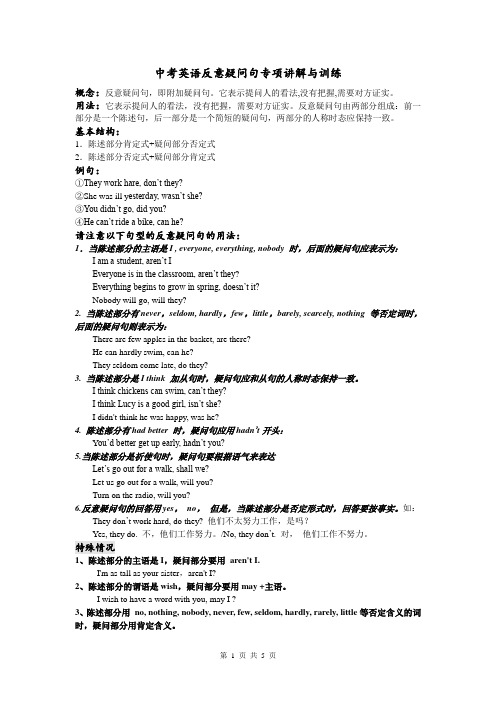
中考英语反意疑问句专项讲解与训练概念:反意疑问句,即附加疑问句。
它表示提问人的看法,没有把握,需要对方证实。
用法:它表示提问人的看法,没有把握,需要对方证实。
反意疑问句由两部分组成:前一部分是一个陈述句,后一部分是一个简短的疑问句,两部分的人称时态应保持一致。
基本结构:1.陈述部分肯定式+疑问部分否定式2.陈述部分否定式+疑问部分肯定式例句:①They work hare, don’t they?②She was ill y esterday, wasn’t she?③You didn’t go, did you?④He can’t ride a bike, can he?请注意以下句型的反意疑问句的用法:1.当陈述部分的主语是I , everyone, everything, nobody 时,后面的疑问句应表示为:I am a student, aren’t IEveryone is in the classroom, aren’t they?Everything begins to grow in spring, doesn’t it?Nobody will go, will they?2. 当陈述部分有never,seldom, hardly,few,little,barely, scarcely, nothing 等否定词时,后面的疑问句则表示为:There are few apples in the basket, are there?He can hardly swim, can he?They seldom come late, do they?3. 当陈述部分是I think 加从句时,疑问句应和从句的人称时态保持一致。
I think chickens can swim, can’t they?I think Lucy is a good girl, isn’t she?I didn't think he was happy, was he?4. 陈述部分有had better 时,疑问句应用hadn’t开头:Y ou’d better get up early, hadn’t you?5.当陈述部分是祈使句时,疑问句要根据语气来表达Let’s go out for a walk, shall we?Let us go out for a walk, will you?Turn on the radio, will you?6.反意疑问句的回答用yes,no,但是,当陈述部分是否定形式时,回答要按事实。
- 1、下载文档前请自行甄别文档内容的完整性,平台不提供额外的编辑、内容补充、找答案等附加服务。
- 2、"仅部分预览"的文档,不可在线预览部分如存在完整性等问题,可反馈申请退款(可完整预览的文档不适用该条件!)。
- 3、如文档侵犯您的权益,请联系客服反馈,我们会尽快为您处理(人工客服工作时间:9:00-18:30)。
初中英语语法——反意疑问句
1)陈述部分的主语是I,疑问部分要用aren't I.
I'm as tall as your sister,aren't I?
2)陈述部分的谓语是wish,疑问部分要用may +主语。
I wish to have a word with you, may I?
3)陈述部分用no, nothing, nobody, never, few, seldom, hardly, rarely, little等否定含义的词时,疑问部分用肯定含义。
The Swede made no answer, did he / she?
Some plants never blown (开花), do they ?
4)含有ought to 的反意疑问句,陈述部分是肯定的,疑问部分用shouldn't / oughtn't +主语。
He ought to know what to do, oughtn't he? / shouldn't he?
5)陈述部分有have to +v. (had to + v.),疑问部分常用don't +主语(didn't +主语)。
We have to get there at eight tomorrow, don't we?
6)陈述部分的谓语是used to 时,疑问部分用didn't +主语或usedn't +主语。
He used to take pictures there, didn't he? / usedn't he?
7)陈述部分有had better + v. 疑问句部分用hadn't you?
You'd better read it by yourself, hadn't you?
8)陈述部分有would rather +v.,疑问部分多用wouldn't +主语。
He would rather read it ten times than recite it, wouldn't he?
9)陈述部分有You'd like to +v. 疑问部分用wouldn't +主语。
You'd like to go with me, wouldn't you?
10) 陈述部分有must 的疑问句,疑问部分根据实际情况而定。
He must be a doctor, isn't he?
You must have studied English for three years, haven't you? / didn't you?
He must have finished it yesterday, didn't he?
11) 感叹句中,疑问部分用be +主语。
What colors, aren't they?
What a smell, isn't it?
12)陈述部分由neither… nor, either… or 连接的并列主语时,疑问部分根据其实际逻辑意义而定。
Neither you nor I am engineer, are we?
13)陈述部分主语是指示代词或不定代词everything, that, nothing, this, 疑问部分主语用it。
Everything is ready, isn't it?
14)陈述部分为主语从句或并列复合句,疑问部分有三种情况:
a. 并列复合句疑问部分,谓语动词根据邻近从句的谓语而定。
Mr. Smith had been to Beijing for several times, he should have been in China now, shouldn't he?
b. 带有定语从句,宾语从句的主从复合句,疑问部分谓语根据主句的谓语而定:
He is not the man who gave us a talk, is he?
He said he wanted to visit Japan, didn't he?
c. 上述部分主句谓语是think, believe, expect, suppose, imagine等引导的定语从句,疑问部分与宾语从句相对应构成反意疑问句。
I don't think he is bright, is he?
We believe she can do it better, can't she?
15) 陈述部分主语是不定代词everybody, anyone, somebody, nobody, no one等,疑问部分常用复数they,有时也用单数he。
Everyone knows the answer, don't they?(does he?)
Nobody knows about it, do they? (does he?)
16) 带情态动词dare或need的反意疑问句,疑问部分常用need (dare ) +主语。
We need not do it again, need we ?
He dare not say so, dare you?
当dare, need 为实义动词时,疑问部分用助动词do + 主语。
She doesn't dare to go home alone, does she?
17)省去主语的祈使句的反意疑问句,疑问部分用will you。
Don't do that again, will you?
Go with me, will you / won't you ?
注意:Let's 开头的祈使句,后用shall we?
Let us 开头的祈使句,后用will you?
Let's go and listen to the music, shall we?
Let us wait for you in the reading-room, will you ?
18)陈述部分是"there be"结构的,疑问部分用there省略主语代词。
There is something wrong with your watch, isn't there?
There will not be any trouble, will there?
19)否定前缀不能视为否定词,其反意疑问句仍用否定形式。
It is impossible, isn't it?
He is not unkind to his classmates, is he?
20)must在表"推测"时,根据其推测的情况来确定反意疑问句。
He must be there now, isn't he?
It must be going to rain tomorrow, won't it?
快速记忆表
陈述部分的谓语疑问部分
I aren't I
Wish may +主语
no, nothing ,nobody ,never,
few, seldom, hardly,肯定含义
rarely, little等否定
含义的词
ought to(肯定的)shouldn't/ oughtn't +主语
have to+v.(had to+v.)don't +主语(didn't +主语)
used to didn't +主语或usedn't +主语
had better + v.hadn't you
would rather + v.wouldn't +主语
you'd like to + v.wouldn't +主语
must根据实际情况而定
感叹句中be +主语
Neither…nor,
either…or 连接的根据其实际逻辑意义而定
并列主语
指示代词或不定代词
everything, that,主语用it
nothing, this
并列复合句谓语根据邻近从句的谓语而定定语从句,宾语从句的
主从复合句根据主句的谓语而定
think, believe, expect,
suppose, imagine等引导与宾语从句相对应的从句everybody, anyone,
somebody, nobody, no one复数they, 单数he
情态动词dare或need need (dare ) +主语
dare, need 为实义动词do +主语
省去主语的祈使句will you?
Let's 开头的祈使句Shall we?
Let us 开头的祈使句Will you?
there be相应的谓语动词+there(省略主语代词)
否定前缀不能视为否定词仍用否定形式
must表"推测"根据其推测的情况来确定反意疑问句。
